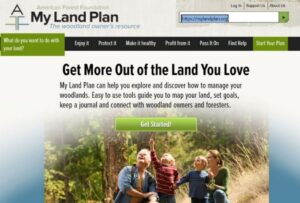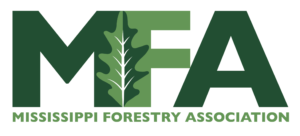A Landowner’s Guide to Working with a Forester
This Landowner’s Guide is provided to help you work with a forester to achieve your forest management goals. And if you also desire to qualify for Tree Farm Certification, this guide can help. Whether this is your first management plan, or you want to update an existing or outdated plan, this guide will be beneficial.
Forest Resource Professionals
Forest management plans rely on the experience, skills, and thoughtfulness of foresters and other resource professionals. A forester that knows you and your goals will write a better plan. Therefore, building a relationship with your forester is central to your success as a landowner. The MS Landscape Management Plan helps by freeing foresters from extensive plan writing so they have more time for you.
What is a Mississippi Registered Forester? (Source: MS Board of Registration for Foresters)
“A forester is a person who by reason of his knowledge of the natural sciences, mathematics, economics, and the principles of forestry and by his demonstrated skills acquired through professional forestry education…is qualified to engage in the practice of forestry…” (Mississippi Foresters Registration Law of 1977).
The Foresters Registration Law of 1977 (amended in 1989) defines the practice of forestry to include consultation, investigation, evaluation, valuation, planning, and silviculture and harvest recommendations. Any person offering forestry services to the public must be licensed.
By law, no person may refer to himself as a forester; nor may any person sell, advertise, or otherwise promote his services as a professional forester in Mississippi, without being duly registered (licensed) by the State Board of Registration for Foresters (BORF).
What is a Consulting Forester? (Source: MS Board of Registration for Foresters)
A Consulting Forester is a Registered Forester whose principal business activity is forestry consulting work for the general public on a fee or contractual basis with no economic interest or participation in a timber purchasing or procurement entity. A Consulting Forester cannot purchase timber or participate in logging activities and represent the best interest of a client.
Finding a Forester
Organizations that can help you find a forester and other professionals:
MS Board of Registration for Foresters (BORF) – Registered & Consulting Foresters
Mississippi Forestry Commission – Agency Service Foresters
Society of American Foresters – Certified Foresters
Mississippi Association of Consulting Foresters – ACF Members
Mississippi Forestry Association – Qualified Tree Farm Inspectors
MS Wildlife Fisheries and Parks – Wildlife Biologists
Foresters provide consultation and advice. They identify and characterize site-specific features like timber species, size, density, age, and health. They simplify complex relationships between air, water, climate and weather, trees, flora and fauna, and ecosystem processes. Next, this environmental data is merged with economic considerations.
A forester takes site, timber, and market information and combines it with your management goals to create a Stand Management Map, Stand Management Recommendations and a 10-year Schedule of Forest Activities. These items are the key to your success. They are also the foundation of the MS LMP.
Foresters can help you document and retain records of forest management activities. Records ensure accomplishment of objectives and track changes over time. Documentation is also valuable for Tree Farm Certification, taxes, loans, and heirs.
Foresters can help you seek other professionals in specialized areas of contract law, taxes, estate planning, and other relevant laws, regulations, and ordinances. Consultation with an insurance agent or attorney will give you a perspective on liability issues and appropriate insurance minimums.
Foresters can help you manage and monitor vendors and contractors performing silvicultural management activities. Forestry Vendors – Mississippi Forestry Commission (ms.gov) has a brief listing of forestry related service providers for tree planting, herbicide applications, site preparation, and prescribed fire. Foresters ensure these contractors follow all relevant laws and regulations with special emphasis on MS Forestry Best Management Practices.
Technical advice on forest health, herbicides, and other issues are available from Forestry / Mississippi State University Extension. MS Wildlife, Fisheries, & Parks (mdwfp.com) provides guidance on how you can improve wildlife habitat or start a prescribed fire program. If business income from hunting or fishing enterprises is your desire, then Natural Resource Enterprises (msstate.edu) is a perfect place to start. The National Timber Tax website has great tax information and can guide you on setting up your business structure.
Working with a Forester
Step 1. Preparing to Meet a Forester
-
- Prepare property information and features that you want to discuss with your forester. This may include property and family history, special sites, current uses, property lines and corners.
- Decide who will be helping you manage your property in 10 or 25 years. Or owning it?
- To help you develop objectives for your property, The Management Objectives Tab on this website offers several objectives you might consider. The American Forest Foundation also provides information about developing objectives on their My Land Plan website (Figure below).

Step 2. Meeting a Forester
-
- Communicate your objectives clearly to your forester. If you have multiple objectives, you should prioritize them. And be prepared to phrase objectives in a way your forester understands.
- Review potential landscape objectives with your forester as needed. These include Invasive Species, Threatened and Endangered Species, Forests of Recognized Importance, and Special Sites. If any are applicable to your property, discuss how to address them in the plan. Adjust to reduce any conflicts that arise against your objectives. This review is required for Certified Tree Farmers.
- Communicate your desired forest type(s). Your preferred forest type can be quite different than the current one. Many timber types are possible. Your forester can tell you which timber types are the most likely to be profitable on your land.
- Identify silvicultural treatments and other actions needed to achieve your objectives.
- You and your forester develop a 10-year work schedule of forest activities.
- Share with your forester the kinds of help that you expect in this 10-year schedule going forward. This may be a little or a lot, depending on your circumstances. Forester follow-through is highly valuable as it ensures achievement of management goals.
- Your situation may require more financial information. For a fee, foresters can provide a timber appraisal, estimate timber growth and yield, and approximate future costs and revenues.
Step 3. After the Visit
-
- Contact your forester with any unanswered questions.
- Following any discussions, submit your notes and thoughts so your forester can incorporate them into the plan.
- Within a month, expect a Forest Management Plan from your forester. Your Plan will reflect the findings and opinions of your forester along with your objectives. The Plan may be your forester’s own creation or a completed Forest Management Plan Template. At a minimum, your plan should include a Forest Stand Map, Stand Management Recommendations, and your 10-year Work Schedule of Forest Activities.
- Review your Plan to make sure it matches your objectives. If differences exist, request a change from your forester.
- Certified Tree Farmers must periodically monitor their property to prove conformance to Standards. You or your forester can meet this monitoring requirement.
What do Foresters normally charge for services?
The fee amount that will be charged for your Forest Management Plan and other services is negotiated between you and your forester. A plan’s cost reflects the time your forester spent on your property collecting information, interviewing you, and office work. Landowners are not charged for any ATFS Inspections for Tree Farm Certification.
A guide that may help you in negotiating fees is the 2013 Mississippi Consulting Forester Fees and Services publication. Unfortunately, it is over 10 years old. Alabama Cooperative Extension System / Auburn publishes average fees charged by foresters in the Southeastern US about every 2 years. Their most recent publication was Costs & Trends of Southern Forestry Practices 2022.
